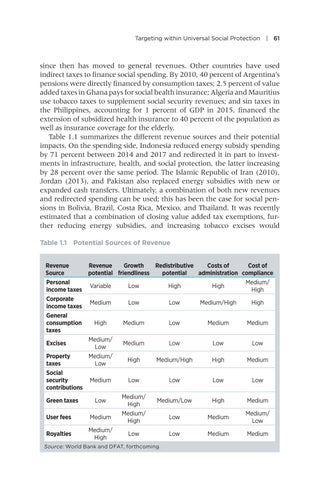Targeting within Universal Social Protection | 61
since then has moved to general revenues. Other countries have used indirect taxes to finance social spending. By 2010, 40 percent of Argentina’s pensions were directly financed by consumption taxes; 2.5 percent of value added taxes in Ghana pays for social health insurance; Algeria and Mauritius use tobacco taxes to supplement social security revenues; and sin taxes in the Philippines, accounting for 1 percent of GDP in 2015, financed the extension of subsidized health insurance to 40 percent of the population as well as insurance coverage for the elderly. Table 1.1 summarizes the different revenue sources and their potential impacts. On the spending side, Indonesia reduced energy subsidy spending by 71 percent between 2014 and 2017 and redirected it in part to investments in infrastructure, health, and social protection, the latter increasing by 28 percent over the same period. The Islamic Republic of Iran (2010), Jordan (2013), and Pakistan also replaced energy subsidies with new or expanded cash transfers. Ultimately, a combination of both new revenues and redirected spending can be used; this has been the case for social pensions in Bolivia, Brazil, Costa Rica, Mexico, and Thailand. It was recently estimated that a combination of closing value added tax exemptions, further reducing energy subsidies, and increasing tobacco excises would Table 1.1 Potential Sources of Revenue Revenue Revenue Growth Redistributive Costs of Cost of Source potential friendliness potential administration compliance Personal Medium/ Variable Low High High income taxes High Corporate Medium Low Low Medium/High High income taxes General consumption High Medium Low Medium Medium taxes Medium/ Excises Medium Low Low Low Low Property Medium/ High Medium/High High Medium taxes Low Social security Medium Low Low Low Low contributions Medium/ Green taxes Low Medium/Low High Medium High Medium/ Medium/ User fees Medium Low Medium High Low Medium/ Royalties Low Low Medium Medium High Source: World Bank and DFAT, forthcoming.


